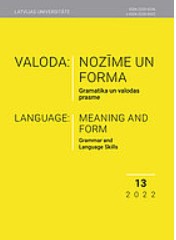Vārdu skolas izteicienu valodnieciskie aspekti
Linguistic aspects in statements of the School of Names
Author(s): Agita BaltgalveSubject(s): Semiotics / Semiology, Semantics, East Asian Philosophy, Philosophy of Language
Published by: Latvijas Universitātes Akadēmiskais apgāds
Keywords: Classical Chinese language; Chinese classical philosophy; semantics; semiotics; grammar;
Summary/Abstract: The article introduces readers to one of the movements of traditional Chinese thought – the School of Names. Such teachings as Daoism and Confucianism are widely recognised, whereas the School of Names is known only by few. Generally, ideas of this teaching are studied in the context of philosophy – logic and sophism. On the other hand, the author’s opinion is that representatives of School of Names can be considered the first Chinese linguists. In ancient China, the field of linguistics was not singled out and was not studied; and these philosophers were the first to focus on the linguistic analysis of sentences and concepts, discussing issues related to sentence structure, meaning of words, and form of Chinese characters. Thus, the aim of the research is to select and to examine those statements of the School of Names which show linguistic features. The analysis is based on a semantic and semiotic approach, translating selected fragments of original texts, and explaining grammar specifics and pictographic elements of certain words. At times, the etymology of words and Chinese characters are also considered. The article is divided into five sections. First of all, the historical development of Chinese linguistics and the School of Names is briefly described. This section is followed by a linguistic analysis of the name of the school and of the main theses by philosophers. The last section provides an evaluation of the philosophy of the School of Names in comparison with the ideas of other classical Chinese philosophers. Conclusions show that the main purpose of disputes among thinkers of the School of Names is mainly philosophy and cognitive logic; however, their theses also reveal linguistic aspects and analysis. In the context of Chinese Classics, these ideas are not popular, because they do not reveal a deep meaning and morality that could be useful to society. However, many expressions by thinkers of the School of Names refer to morphology, etymology, semiotics, semantics, and grammar, hence, they are important as witnesses of linguistic discussion. These and other concepts did not yet exist in China at that time. They only have appeared in the 19th–20th centuries due to the influence of Western sciences and still remain relevant nowadays in the theory of modern Chinese linguistics.
Journal: Valoda: nozīme un forma
- Issue Year: 2022
- Issue No: 13
- Page Range: 22-34
- Page Count: 13
- Language: Latvian

